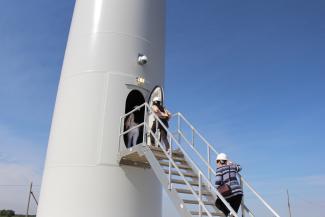USAID Partners with Energy Stakeholders to Promote Diversity, Equity, Access, and Inclusion
After the fall of the Soviet Union, the governments of all five Central Asian countries made commitments to promoting equal rights and opportunities for all people as well as joining international human rights conventions. Nevertheless, women still encounter cultural and social barriers when entering technical and management fields, which are traditionally considered to be more suitable for men.
In Kazakhstan, only 25 percent of energy sector jobs are held by women. In a modern and rapidly changing world, women have successfully demonstrated they are fully able to work in all sectors of the economy and play an increasingly significant role in strengthening peace and security.
In the last decade, the boundaries between traditionally female and male-dominated professions have leveled and gender stereotypes are gradually disappearing from the energy industry.
Currently, 44% of employees at Kazakhstan’s Ministry of Energy are women, indicating that women are entering specialties that were once considered male professions. These specialties include conventional energy generation, subsoil use, oil and gas chemistry, oil development and production, as well as the development of renewable and nuclear energy and industry.
Leila Omarkhanova, 29, graduated from the People’s Friendship University of Russia in Moscow and works as a Lead Expert at the Department of Renewable Sources of Energy at the Ministry of Energy of Kazakhstan. Leila is one of almost 400 Kazakhstani women trained at various technical workshops and trainings conducted by USAID’s Power the Future Activity over the last four years. To create more employment opportunities for young women, USAID created a professional internship program for 14 female power engineering students in 2019. The Ministry of Energy assigned many of these students to the departments of renewable energy, electric energy, and atomic energy. Seeing these young women gaining their first professional experiences reminded Leila of her career path.
“I was delighted to learn that this internship program was launched by USAID. The young women worked hard and received first-hand experience on how to plan and draft bills and policies for the power sector, renewables, atomic energy and industry,” said Leila.
Since 2019, USAID’s Power the Future Activity has organized site visits to wind and solar plants to give female students and professionals opportunities to network, share experiences, and develop industry relationships.
“Through USAID, I visited several power plants: Burnoye solar power plant in the Zhambyl region, the country’s first wind power plant in Ereimentau, and a wind power plant built for Astana Expo 2017,” said Leila.
On September 7, 2021 USAID’s Power the Future hosted a virtual event on Women’s Leadership in the Energy Sector to give young women in technical and non-technical disciplines insights about future careers in the renewable energy field.
“I am very interested in working in the energy sector and promoting the interests of Kazakhstan. I was very happy to learn of USAID’s workshops that support aspiring young women,” said Malika Ermagambetova, an undergraduate student of international law at M. Narikbayev Kazakh Humanities and Law University.
In the past year, Kazakhstan has prioritized the empowerment, education, and training of women: on July 1, 2021 President Kassym-Jomart Tokayev announced a nationwide launch of resource centers to support female entrepreneurs.
In recent years, the country also launched mentorship and job-skill training programs for women, and in August 2021, Nur-Sultan became the seventeenth city in the world and the first in Central Asia to join the C40 Women4Climate Mentorship Program. As Kazakhstan takes progressive steps to liberalize its economy, USAID will continue to work with the Government of Kazakhstan and its partners to empower young women and professionals.
By working together, the Government and USAID will continue to create agents of change who will build acceptance and understanding about the social, political, and economic benefits women bring to Kazakhstan’s energy sector.
“USAID has done a lot of work in the field of renewable energy development in Kazakhstan, including their educational programs in universities. However, more can be done. In the field of renewable energy, we see a low level of awareness, especially in rural areas. We need to make these opportunities more accessible and visible to girls and youth of our country,” said Kairat Bakenov, Director, Kazakh Research Institute of Energy.

